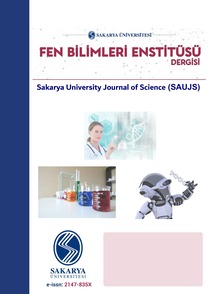Numerical Assessment of Symmetric and Non-Symmetric Kernel Functions on Second Order Non-Homogenous Volterra Integro-Differential Equations
Numerical Assessment of Symmetric and Non-Symmetric Kernel Functions on Second Order Non-Homogenous Volterra Integro-Differential Equations
___
- [1] P. Linz, “Analytic and Numerical Methods for Volterra Equations”, SIAM, Philadelphia, Pa, USA, Pp 132-139, 1985.
- [2] T. H. Christopher Baker, “Structure of recurrence relations in the study of stability in the numerical treatment of Volterra integral and integro-differential equation”, Journal of Integral Equations, 2 (1980) 11- 29.
- [3] R. Kanwall, K. Liu. “A Taylor expansion approach for solving integral equations”. International Journal of Mathematical Education in Science and Technology, 20 (2006), 411–414, 1989.
- [4] S. Yuzbasi, N. Sahin, M. Sezer. “Bessel polynomial solutions of high-order linear Volterra integro-differential equations”. Computers & Mathematics with Applications, 62, 1940–1956, 2011.
- [5] Jalil Rashidinia and Ali Tahmasebi “Approximate solution of linear integro- differential equations by using modified Taylor expansion method” World Journal of Modelling and Simulation, 9(4), 300, 2013.
- [6] A. Avudainayagam, C. Vani, “Wavelet- Galerkin method for integro-differential equations”, Applied Numerical Mathematics, 32 (2000) 247-254.
- [7] J. Rashidinia, A. Tahmasebi, “Approximate solution of linear integro-differential equations by using modified Taylor expansion method”, World Journal of Modelling and Simulation, 9 (4) (2013), 289-301.
- [8] K. Maleknejad, F. Mirzaee and S. Abbasbandy, “Solving linear integro- differential equations system by using rationalized Haar functions method”, Applied Mathematical and Computation,155(2004), 317–328.
- [9] S.Q. Wang and J.H. He, “Variational iteration method for solving integro- differential equations”, Phys. Lett. A, 367 (2007), 188-191.
- [10] M. Mohseni Moghadam, H. Saeedi “Application of Differential Transforms for solving the Volterra Integro-Partial Differential Equations”, Iranian Journal of Science & Technology, Transaction A, Vol. 34, 2010
- [11] J.H. He, “Homotopy perturbation technique”, Computation Meth. Appl. Mech. Eng., 178, 257-262 1999.
- [12] P. Linz, “Linear multi step methods for Volterra integro-differential equations”, Journal of the ACM (JACM), 16 (1969), 295-301.
- [13] Falade K.I “Solving Integro-Differential equations using exponentially fitted collocation approximate technique” Middle East Journal of Science 5(1) (2019), 73-85.
- [14] Abdul-Majid Wazwaz. “Linear and Nonlinear Integral Equations Methods and Applications” Saint Xavier University Chicago, IL 60655 April 20, 2011 pp 65- 72.
- [15] Ramesh Kumar Vat, “M.SC. Mathematics MAL-644 Integral equation and symmetric kernel“ (2005) pp239-245.
- [16] G. Adomian, “Solving Frontier problems of physics: The decomposition method” Kluwer Pp 123-134, 1994.
- [17] K. Maleknejad and M. Hadizadeh, “A New computational method for Volterra- Fredholm integral equations”, Comput. Math. Appl., 37 (1999), 1–8.
- ISSN: 1301-4048
- Yayın Aralığı: 6
- Başlangıç: 1997
- Yayıncı: Sakarya Üniversitesi Fen Bilimleri Enstitüsü
A Multi-task Deep Learning System for Face Detection and Age Group Classification for Masked Faces
Development and Validation of RP-HPLC Method for the Determination of Dexrabeprazole Sodium
Semra YILMAZER KESKİN, Ebru Nurdan ŞENTÜRK, Cihansel UNLU
Preparation and Characterization of Biocompatible Membranes Based on TiO2 Nanoparticul
Kazeem Iyanda FALADE, Ismail Gboyeka BAOKU, Abdulgafar Tunde TIAMIYU
Analysis of the Saliency Ratio Effect on the Output Torque and the System Efficiency in IPM Drives
Osman Emre ÖZÇİFLİKÇİ, Mikail KOÇ
Determination of Indoor Air Quality in University Student Canteens
Nil KAYA, Elif Özlem ARSLAN AYDOĞDU, Ayten KİMİRAN
The Effect of Derived Features on Art Genre Classification with Machine Learning
